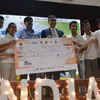A water-saving air cooler with aromatherapy won Rs 1 lakh at the Smart India Hackathon
Students from Coimbatore designed a cooler that uses less water, and imparts destressing aromas thanks to a botanical element at the Smart India Hackathon
The threat of global warming is very noticeable in our lives. This June was the hottest across Europe. Kerala reported 288 cases of sunburn/sunstroke. Yes, climate change is here to stay.
At the recently held Smart India Hackathon 2019 - Hardware edition, Team Sparklers addressed the heat wave with their prototype of a water-saving air cooler that also doubles as an aromatherapist, albeit non-human! Their innovation was among the finalists at the SIH grand finale held last month. The team won a cash prize of Rs 1 lakh at Dayananda Sagar University, one of the 19 nodal centres for the hackathon.
Team leader Janani B (19) and some fellow students from the Bannari Amman Institute of Technology in Coimbatore had had enough of the rising temperature, so they developed their own cooling solution. Janani was helped in the project by Karishma M (18), Rahul S (19), Rajmohan M (19), Pravin M (18), Rajith Karna D (20).
They started their work on a problem statement presented by Bajaj Electricals - to design an air cooler with minimum water consumption.
Leveraging Internet of Things (IoT), the team developed a water-efficient cooler while adding wellness elements with aromatherapy.

Team Sparklers
How cool is the air?
Their multi-purpose appliance, the team explains, based on “Peltier module”, provides a cooling effect. A sensor in the machine detects room temperature, and sets the amount of water flow on two sides, accordingly, as opposed to the three-sided conventional air coolers available in the market.
“While coolers in the market consume around 50 litres of water, our technology uses only 30 litres. And 20 litres of water makes a huge difference, especially in dry areas like Rajasthan where water is an expensive commodity,” says team member Rajith.
Interestingly, the tech-savvy students found inspiration for aromatherapy with a plant - Chrysopogon Zizanioides which was placed on the ridges where water flows. The botanical marvel controls water evaporation and is also aromatic. The plant’s fragrance is known to cure insomnia and help people relax. The machine was made trapezoid-shaped, to allow more contact with the air.
In talks with Bajaj Electricals
While the working mechanism fell into place with a few trials spaced out over a period, its exterior, materials and resources were confined to what they could source at college. This short-changed them. Thus, even though plastic was a more viable option, they did not have access to the technology to mould plastic to give their appliance its curves and shape.
1565159857616.png?fm=png&auto=format)
A prototype of the air cooler
They decided to use texlon which is flexible though expensive. Having spent Rs 12,000 on the prototype, the materials cost upto Rs 7,000. Another drawback, Rajith says, is that the material used is much heavier.
On the bright side, the cost of their product is expected to reduce by 10 percent when mass-produced. Currently, the team is in talks with Bajaj Electricals and hopes to launch their product in the market soon.
Participating in their first hackathon, the team called themselves the Sparklers because of their “spark” of innovative ideas that help in real-life problems.
To instill and foster innovation among students, the Central government started the Smart India Hackathon (SIH) in 2017, and recently concluded the third edition successfully.
YourStory brings to you some amazing young minds and their innovations which solve many of the country’s issues across various streams.
(Edited by Suruchi Kapur-Gomes)



1564138444749.png?fm=png&auto=format&h=100&w=100&crop=entropy&fit=crop)






